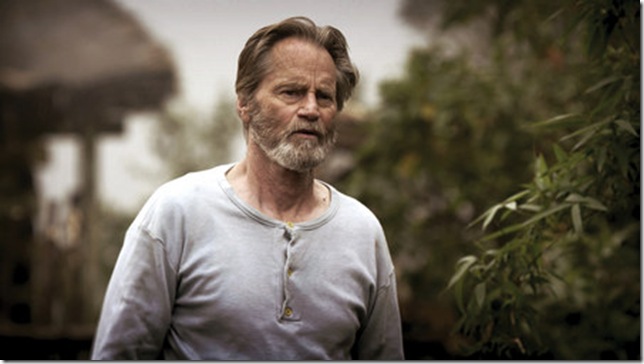George Roy Hill’s Butch Cassidy and the Sundance Kid, a film that felt awfully new in its time and now feels as musty as mothballs, ended on an iconic freeze-frame of the titular bandits plunging into a hail of gunfire and their certain deaths: the outlaw criminals as tragic fatalists.
This retelling of the real-life Cassidy story climaxed on the conventional wisdom of the time, that Butch and Sundance indeed perished in a police shootout in Bolivia. But, since 1974, dribs and drabs of circumstantial, anecdotal information have emerged suggesting that Cassidy lived, possibly until 1936, under a cloak of anonymity, like a Western version of Carlos the Jackal.
The juicy narrative possibilities of a mellower Cassidy growing old in the dusty Southwest were enough to attract first-time screenwriter Miguel Barros and director Mateo Gil (who wrote the Spanish hit Abre Los Ojos and its American remake, Vanilla Sky) to this apocryphal re-envisionment of Cassidy’s weary, post-Sundance life.
Here, Cassidy, played by a rugged, weathered Sam Shepard (is there any other kind?) is living in a South American pueblo under the name James Blackthorn, some 27 years after his disputed death. At the film’s opening, he’s selling all but one of his horses and withdrawing his entire $6,000 bank account in preparation for a journey to the United States to meet a niece (or nephew) to whom he writes letters.
His trip is swiftly stifled by the appearance of Eduardo (Eduardo Noriega), a bandit on the run, whose sneak attack leads to the escape of Cassidy’s equine and his entire cache of cash. The two bond, albeit with guns perpetually pointed in each other’s direction, as they head toward a mine where Eduardo says he has hidden $50,000 of an unscrupulous businessman’s money.
Blackthorn thus becomes equal parts road movie, buddy film, Western and memory film, with Gil contrasting Cassidy’s modern-day exploits with his early-20th-century reign alongside Etta Place and the Sundance Kid (Dominique McElligott and Padraic Delaney).
The point of Barros’ and Gil’s movie can only be expressed in exhausted aphorisms: “Once an outlaw, always an outlaw; history is doomed to repeat itself,” etc. Blackthorn boasts more blood and truer grit than Hill’s Cassidy dramedy, and I have to believe that the actual Cassidy shared more in common with Shepard’s grizzled countenance than Paul Newman’s marquee visage.
But it runs out of gas quicker than a Hummer on a highway, beginning to crater with the appearance of Stephen Rea, hamming it up embarrassingly as the alcoholic investigator who always knew Cassidy was still alive. The turgid patches that slowed down some of the action in the first half become the movie’s full-time pacing.
The shadows of Monte Hellman and Sam Peckinpah come and go from Gil’s palette of influences – the former in a number of expressively endless landscapes Cassidy rides across in existential isolation, and the latter in some hilariously crass scenes and dialogue: “Your ass is softer than a bookkeeper’s,” Cassidy remarks, after rubbing a cream on Eduardo’s buttocks to cure a saddle sore. Blackthorn could have used more of Bloody Sam’s inspiration to spruce up its own creaky, aching joints.
Shepard tends to leave more of an auteurist imprint on this project than its makers; as a playwright and actor, he’s staked his flag in Southwestern locales and twilight portraits. But a film he collaborated on a few years back, The Assassination of Jesse James by the Coward Robert Ford, only shows the artistic potential this kind of revisionist Western iconography can have. Alternative history should be a lot more fun and imaginative than Blackthorn.
BLACKTHORN. Director: Gil Mateo. Cast: Sam Shepard, Eduardo Noriega, Stephen Rea, Magaly Solier, Dominique McElligott, Nikolaj Coster-Waldau, Padraic Delaney; Distributor: Magnolia; Rating: R; Opens: Friday at Living Room Theaters at FAU and Tower Theatre in Miami
